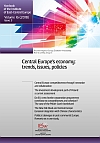Political cleavages in post-communist Europe. Romania as a case study
Political cleavages in post-communist Europe. Romania as a case study
Author(s): Cristina MATIUTASubject(s): Politics
Published by: Instytut Europy Środkowej
Keywords: political cleavages; political parties; Romania; post-communism
Summary/Abstract: The concept of cleavage, as it was theorized by Stein Rokkan in the late 1960s, sends to a deep and lasting division between groups, based on a certain type of conflict. It links the individual behaviour to macro-historical processes that will shape the political field for decades. A controversial issue is the application of the Western Europe-specific cleavages, where national and industrial revolutions have produced profound transformations with a lasting impact on party systems, outside this area. By focusing on the Romanian case, the paper explores the cleavages before the establishment of communism and those emerged after its collapse, results of this regime and/or of the process of transition to democracy. The adopted perspective is to use Rokkan’s typology as a reference point, to analyze the extent to which it has descriptive capacity for the Romanian space, and even if losing the rigor of definition, to refer to the tensions and divisions which, although not necessarily leading to the emergence of political parties, have the potential to shape the political action.
Journal: Rocznik Instytutu Europy Środkowo-Wschodniej
- Issue Year: 16/2018
- Issue No: 3
- Page Range: 147-164
- Page Count: 18
- Language: English

